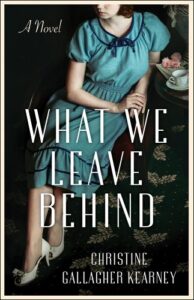 CHICAGO, IL–Inspired by the life of Christine Gallagher Kearney’s maternal grandmother, “What We Leave Behind” (She Writes Press, July 25, 2023) is an engrossing WWII-era narrative of love, loss, and one woman’s search for identity after being separated from her homeland and husband.
CHICAGO, IL–Inspired by the life of Christine Gallagher Kearney’s maternal grandmother, “What We Leave Behind” (She Writes Press, July 25, 2023) is an engrossing WWII-era narrative of love, loss, and one woman’s search for identity after being separated from her homeland and husband.
About the book: In 1947, war bride Ursula arrives in Minneapolis torn between guilt over leaving loved ones behind and her desire to start a new life, and a family. But the American dream proves elusive—she is struck with polio, and then shocked by the sudden death of her GI husband.
Without a spouse or the child she so desperately wanted, Ursula must rely on her shrewd survival skills from wartime Berlin, and she takes in a boarder to help make ends meet. She soon falls in love with the Argentinean medical technician living in her spare bedroom, but his devotion to communism troubles her—and when she finds herself pregnant with his child, she is faced with a dilemma: how to reconcile her dream of motherhood with an America that is so different from what she imagined.
Based on a true story, this WWII novel considers the lengths to which we’ll go to improve our lives, and the ways we cope with unexpected setbacks. With timely meditations on war, immigration, disability and women’s issues, “What We Leave Behind” is sure to be a conversation-starter and book club favorite.
“What We Leave Behind”
Christine Gallagher Kearney | July 25, 2023 | She Writes Press | Historical Fiction
Paperback | ISBN: 978-1-64742-493-0 | $17.95
Ebook | 978-1-64742-494-7 | $9.95
Praise for Christine Gallagher Kearney and “What We Leave Behind”
“Christine Gallagher Kearney adeptly crafts the story of a German war bride, whose dreams of comfort and ease in mid-century America pan out quite differently than imagined, but who, battling polio, loneliness, and an unexpected pregnancy, grows into her own life’s stern heroine.”
–Annette Gendler, author of “Jumping Over Shadows” and “How to Write Compelling Stories from Family History”
“‘What We Leave Behind’ is a stirring narrative of love, determination, loss, and renewed resolve. Gallagher Kearney’s understanding of the difficulties and challenges of disability coupled with the angst of separation from family illuminate every page. As a polio survivor, I nodded often at her portrayals of the nuances of disability and how it affects one’s familial, social and romantic life. Thanks to Gallagher Kearney’s deft prose, her grandmother Ursula will not be left behind.”
–Francine Falk-Allen, author of “Not a Poster Child: Living Well with a Disability”
“‘What We Leave Behind’ is a heartfelt portrait of a woman whose story—despite the 1940’s setting—feels vital to our contemporary lives. Ursula’s fear, grief, and joy are lovingly rendered by Gallagher Kearney, whose close connection to the source material brings history to life. The novel’s themes are universal: the big swings we take when we dream of something more, the unexpected and profound loss that life contains, and the resiliency that drives us forward.”
—Krista Diamond, contributing freelance writer to The New York Times and HuffPost
About the Author
 Christine Gallagher Kearney is a Midwest Review “Great Midwest Writing Contest” finalist, and a semi-finalist for Chestnut Review’s “Stubborn Artists Contest.” In 2022, she was accepted to StoryStudio Chicago’s StoryBoard fiction workshop led by Ingrid Rojas Contreras. She has published in Wild Roof Journal, Driftless Magazine, ForbesWoman, Fortune, and Cara Magazine and is a former food columnist for the Irish American News. Christine graduated with her bachelor’s degrees in International Relations and Spanish from Mount Holyoke College, later earning her master’s degree in Organizational and Multicultural Communication through DePaul University. She has a career in the corporate world and writes in her off hours. What We Leave Behind is her debut novel (She Writes Press; July 2023). Christine grew up in Minnesota, but now lives in Chicago with her husband and dachshund. To learn more about her work, visit: www.christinegallagherkearney.com
Christine Gallagher Kearney is a Midwest Review “Great Midwest Writing Contest” finalist, and a semi-finalist for Chestnut Review’s “Stubborn Artists Contest.” In 2022, she was accepted to StoryStudio Chicago’s StoryBoard fiction workshop led by Ingrid Rojas Contreras. She has published in Wild Roof Journal, Driftless Magazine, ForbesWoman, Fortune, and Cara Magazine and is a former food columnist for the Irish American News. Christine graduated with her bachelor’s degrees in International Relations and Spanish from Mount Holyoke College, later earning her master’s degree in Organizational and Multicultural Communication through DePaul University. She has a career in the corporate world and writes in her off hours. What We Leave Behind is her debut novel (She Writes Press; July 2023). Christine grew up in Minnesota, but now lives in Chicago with her husband and dachshund. To learn more about her work, visit: www.christinegallagherkearney.com
In an interview, Christine Gallagher Kearney can discuss:
- How the true story of her maternal grandmother’s strength and sacrifices as a war bride influenced this novel
- How she approached the research process for a novel set in the 1940s and 1950s
- Why she almost-gave up writing this book multiple times, and more importantly, how she found the courage to keep going
- How the novel’s exploration of women’s issues remains relevant today
- Why it’s important to learn from history, and what she hopes readers will take away from the novel
An Interview with
Christine Gallagher Kearney
1. “What We Leave Behind” was inspired in part by the life of your maternal grandmother. What did you find most compelling about her life story, and how is that emphasized in the novel?
What I find most compelling about Urusla’s story is that she kept going. She faced countless challenges, but she did not let those challenges stop her. I also love how much she cared about her family, and how much she relied on her own creative pursuits (knitting) as an outlet. She was resilient and persistent!
2. What kind of research did you do in order to accurately portray what life was like for a war bride from Germany in the 1940s and 1950s?
I relied heavily on first-hand accounts from other war brides, newspaper articles and secondary materials.
For research on living with polio, I interviewed polio survivors, and read memoirs of polio survivors. And for my research on the polio hospital in Minneapolis, I relied on the archives at the University of Minnesota, and the Minnesota History Museum.
Finally, Ursula had written her own account of her experiences, so I referenced her journals as well.
3. You mentioned that you almost gave up writing this book multiple times. Where did you find the perseverance to continue on this path, and what advice would you give to other writers who are considering abandoning their projects?
As a child, I wrote a chapter book. I remember drafting the manuscript in a spiral notebook, then later I folded blank pages, bent a piece of cardboard in half to create a cover, then glued the pages inside to create my own book where I transposed the story from the manuscript. Whenever I wanted to quit because I had lost faith in myself, I remembered this Christine from childhood, and her dream of writing and publishing a book. I didn’t want to give up on her, or myself.
My advice for other writers is: find someone who will hold you accountable, and remind you why you started your writing project. My husband played this role for me. I told him: “I’m going to come to you and ask if I can quit, and you’re going to tell me ‘no’, you cannot quit.” He didn’t give up on me, even when I wanted to give up.
4. Although set in the years after WWII, “What We Leave Behind” maintains a sense of timeliness. What’s one theme readers should be on the lookout for?
A big theme in this book is Urusla chasing what she thinks is the American Dream, and part of that dream is becoming a mother. She realizes parts of that dream–some level of stability, opportunity to work, making friends and building a family–but it looks different compared to what she imagined.
5. What do you hope readers will take away from the novel?
I hope readers will learn more about what being a war bride was like after WWII, that they will learn about polio and possibly recognize some of the same fears we experienced during the pandemic. More than anything, I hope they will come to understand the complexities of living with a disability, and what it means to have family, community, social and medical support. And, what it means when support systems are not accessible and/or available, and the consequences of that lack of support.

A former award-winning journalist with national exposure, Marissa now oversees the day-to-day operation of the Books Forward author branding and book marketing firm, along with our indie publishing support sister company Books Fluent.
Born and bred in Louisiana, currently living in New Orleans, she has lived and developed a strong base for our company and authors in Chicago and Nashville. Her journalism work has appeared in USA Today, National Geographic and other major publications. She is now interviewed by media on best practices for book marketing.

